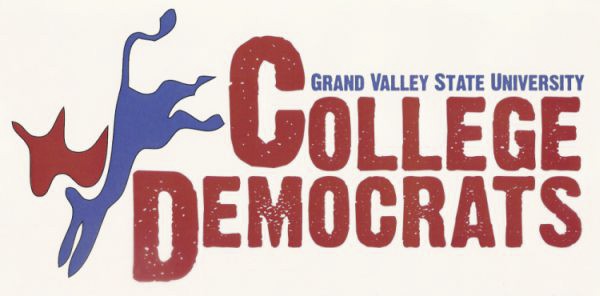College Democrats to host local candidates

Courtesy Photo / gvsu.edu College Democrats Logo
Sep 27, 2010
The Nov. 2 elections will be critical for both Democrats and Republicans, and Grand Valley State University’s College Democrats are doing their part to introduce students to local candidates.
The College Democrats will host a Meet the Candidates event Wednesday in the Pere Marquette Room in the Kirkhof Center from 7 p.m. to 9 p.m. Three local democratic candidates will be in attendance: 75th State House District candidate and Kent County Commissioner Brandon Dillon, 29th State Senate District candidate and Grand Rapids City Commissioner David LaGrand and 2nd Congressional District candidate Fred Johnson.
There will be a question and answer session followed by a meet and greet with the candidates.
“Everyone will have a chance to ask their questions to these guys, no filters – if you want to get your ideas out there to your future leaders, it’s a great way to do it,” said Paul LeBlanc, president of the College Democrats at GVSU.
Dillon, similar to many other candidates, said his emphasis would be on repairing Michigan’s government and its economy.
“Everyone knows the system is broken and we’ve got to shake things up,” he said in a press release. “As a lifelong resident of Grand Rapids and a parent who is raising my sons here, I would be honored to fight for our community in Lansing and work to fix our broken state government.”
This November’s midterm elections will be critical in deciding who controls the House and the Senate. In the Michigan legislative system, 34 seats in the State House and 29 seats in the State Senate are up for grabs. All of the U.S. House of Representatives seats and one-third of the U.S. Senate seats are available this year as well.
Democrats made strong gains across the board in 2006 and 2008, but they are expected to lose many of those seats this year. The battle for control of the House and Senate is being especially hard-fought because of redistricting. New districts tend to favor whichever party is in control of the legislature, an issue that is forefront in the parties’ minds as districts are going to be redrawn next year to reflect the results of the 2010 Census.
Despite the election’s implications, experts expect voter turnout to be drastically lower than 2008, especially among young voters.
The Cook Political Report predicts that seven of Michigan’s 14 Congressional districts – including the district in which Johnson is campaigning – will vote Republican, but Johnson said it’s too early to write anybody off.
“No one owns this district except the voters,” Johnson said.
LeBlanc said the implications of this year’s election make it especially important for voters to get educated and get to the polls.
“These races are some of the most important in the state,” he said. “We could lose control of the House if Dillon loses. LaGrand’s district is one of the few places in the state where the Senate race is still competitive. It’s an important decision for voters not only about which person do they want to represent them, but which party do they want in control.”
Democrats, Republicans and Independents are all encouraged to attend the event.
“It doesn’t matter if you vote because of a party ID or if you vote across party lines; the more informed you are, the better you vote,” LeBlanc said.

























